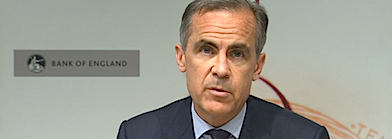The UK’s central bank on Thursday kept interest rates on hold — but two members of the Bank of England’s monetary policy committee (MPC) unexpectedly dissented, voting to cut rates by 25 basis points.
The two dissenters were Jonathan Haskel, the newest member of the MPC, and Michael Saunders.
The Bank of England flagged increased threats to growth from Brexit and a weaker global economy and hinted that it could join other central banks in loosening monetary policy.
The MPC voted 7-2 to maintain Bank Rate at 0.75% — and voted unanimously to keep the stock of sterling non-financial investment-grade bond purchases at £10 billion and the stock of UK government bond purchases at £435 billion.
Bank Rate, according to the path implied by forward market interest rates, is projected at 0.50% in the fourth quarter of 2020. This implies a 25 basis point cut in the coming year.
“Monetary policy could respond in either direction to changes in the economic outlook in order to ensure a sustainable return of inflation to the 2% target. The committee will, among other factors, monitor closely the responses of companies and households to Brexit developments as well as the prospects for a recovery in global growth,” the MPC minutes showed.
“If global growth fails to stabilise or if Brexit uncertainties remain entrenched, monetary policy may need to reinforce the expected recovery in UK GDP growth and inflation.
“Further ahead, provided these risks do not materialise and the economy recovers broadly in line with the MPC’s latest projections, some modest tightening of policy, at a gradual pace and to a limited extent, may be needed,” the MPC added.
Bank of England Governor Mark Carney told reporters: “These are pretty big tectonic forces operating right now.
“If global growth fails to stabilize or if Brexit uncertainties remain entrenched, monetary policy may need to reinforce the expected recovery in UK GDP growth.”
